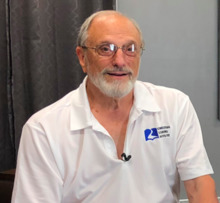Roy A. Clouser | |
|---|---|
 | |
| Nationality | American |
| Alma mater | Gordon College (B.A.) Reformed Episcopal Seminary (B.D.) University of Pennsylvania (M.A. and Ph.D.) |
| Occupation | Professor Emeritus of the College of New Jersey |
Roy A. Clouser is professor emeritus of the College of New Jersey. He has served as professor of philosophy, religion, and logic at the college since 1968. Clouser serves as the resident philosopher of Christian Leaders Institute.[1]
Clouser earned his BA, from Gordon College (Massachusetts), a BD from Reformed Episcopal Seminary, and an MA and PhD from the University of Pennsylvania. Clouser's philosophy PhD from the University of Pennsylvania was received in 1972 for his dissertation entitled Transcendental Critique, Ontological Reduction, and Religious Belief in the Philosophy of Herman Dooyeweerd.[2]
Contribution
Roy Clouser wrote The Myth of Religious Neutrality where he contextualized Herman Dooyeweerd's philosophy into the general audience of American academic dialogue at the College of New Jersey. Bruce C Wearne (BA, MSocSci, PhD), Member, Editorial Board, The American Sociologist wrote,
Clouser's long-term academic involvement in the American academy has given an encouraging demonstration that a biblically-directed Christian scholarship is possible within academic institutions that cannot avoid reflecting the secularised presumptions of a post-modern, post-humanist pagan society[3]
Philosophic Theory Making
Dr Clouser built on Dr. Herman Dooyeweerd's theory of reality. Dr. Clouser cites Dooyeweerd's aspects of reality with these categories[4]
- Fiduciary
- Ethical
- Justitial
- Aesthetic
- Economic
- Social
- Linguistic
- Historical
- Logical
- Sensory
- Biotic
- Physical
- Kinetic
- Spatial
- Quantitative
Dr. Clouser said about these aspects of reality:
I will call these kinds of properties and laws “aspects” of the things we experience, and I am going to refer to the disciplines devoted to their study as “sciences.” The term “aspect” will serve to emphasize that the kinds are exhibited by, and (indirectly) extracted from, the objects of our pre-theoretical experience. The term “science” will mean any specific discipline, delimited by one or more aspects, in which theories are constructed. The list above should not be understood as a dogmatic pronouncement about whether these aspects are all genuine, since there are thinkers who would offer a somewhat different list. Rather, it is intended, first, as a description of (not a theory about) the way we come to experience properties of things in isolation as well as in their connectedness in objects. And second, it is a report of the list of aspects most thinkers have regarded as genuine fields for investigation and theory making. The list, then, is only intended to help us understand the major branches of present-day theory making, not to arrive at the one true list of genuine aspects of the world. So from now on when I use such expressions as “aspects of things,” or “aspects of the world,” or “aspects of our experience,” these expressions must be understood to refer to aspects in the same way the list does. [4]
Publications
- The Myth of Religious Neutrality (University of Notre Dame Press, Notre Dame, 1st edn 1991; 2nd edn 2005).
- Knowing with the Heart (IVP, Downers Grove, 1999; 2nd edn Wipf and Stock, 2007).[5]
External links
- Clouser, Roy A. An Excerpt from The Myth of Religious Neutrality
- Roy Clouser pages: articles; books
- Wearne, Bruce C. "Philosophy as Dependable Analysis: Roy Clouser's Contribution to Christian Scholarship"
- The College of New Jersey: Faculty Profiles
References
- ^ "Roy Clouser - Christian Leaders Institute Professor of Philosophy". Free Ministry Training - Ordination. Retrieved 2018-06-30.
- ^ Catalog of Copyright Entries. Third Series: 1973: Title Index. Copyright Office, Library of Congress. 1975.
- ^ Wearne, Dr. Bruce (August 2018). "All of Life Redeemed - Contributions". All of Life Redeemed. Archived from the original (PDF) on August 2018.
- ^ a b Clouser, Roy (2005). THE MYTH OF RELIGIOUS NEUTRALITY. Indiana: University of Notre Dame Press. pp. Chapter 4. ISBN 978-0-268-07701-3.
- ^ "U-M Library Search". search.lib.umich.edu. Retrieved 2018-06-29.